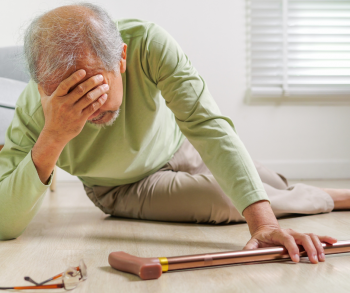Understanding the Common Causes of Falls in Seniors
April 25, 2024

The body changes with age, increasing the risk of accidents and falls. However, age is not the sole reason why falls are so prevalent in the older generation, although it is often seen that way. The truth is that many falls are unavoidable with proper planning—with the help of companion care at home—and an understanding of the common causes of falls.
Understanding Why Falls Occur in the Older Generation
While no two situations are the same, there are some common causes that increase seniors’ risk of falling, including the following:
- Problems with Muscle Weakness and Balance: Aging often causes the muscles to become weaker, which also affects balance. This combination raises the risk of falls, especially if seniors lead a more sedentary lifestyle. For those who are more active, the muscles do not weaken as much, but balance should still be monitored to ensure proper safety.
- Chronic Health Conditions: Illnesses including diabetes, rheumatoid arthritis, or Parkinson's disease can impair balance and mobility, increasing the risk of falls.
- Side Effects of Medication: Seniors who are taking certain medications may experience sleepiness, dizziness, or other side effects that affect their ability to balance and coordinate.
- Environmental Hazards: A few environmental variables that might lead to falls include cluttered rooms and hallways, slick flooring, dim lighting, and bathrooms without grab bars or railings.
- Lack of Assistance: While there are many benefits to aging in place, living alone is also a risk factor where falls are concerned, which is one of many reasons why having companion care at home is vital. This support ensures seniors are monitored and have the help they need.
How Can Companion Care at Home Help?
Speaking of companion care at home, seniors gain valuable assistance from having support in the home.
This assistance can improve their quality of life and safety at home in the following ways:
- Encouraging Physical Activity: Seniors with companion care at home can be encouraged to regularly participate in physical activities that enhance their strength, flexibility, and balance. These exercises improve muscle tone and coordination, which can dramatically lower the risk of falling.
- Medication Management: Companion care at home is also helpful for reminding seniors to take their medications and keeping an eye out for any unfavorable side effects that might impair their ability to balance or think clearly.
- Home Safety Evaluations and Recommendations: Companion care at home can also help seniors and loved ones properly assess the home for possible risks and make suggestions for improvements. This could include decluttering, adding grab bars to the bathroom, and adding lighting where needed.
- Help with Activities of Daily Living (ADLs): Seniors who have difficulty with ADLs like clothing, grooming, bathing, and meal preparation are more likely to fall. However, with hands-on support, they are less likely to have accidents and are not required to exert themselves as much.
Although falls among seniors are a serious concern, they are not a necessary aspect of aging. Seniors may age in place with safety and freedom when preventive measures are put in place. Additionally, loved ones can work with companion care at home to ensure seniors have everything they need and that their home is safe.
If you or your loved one is looking for Companion Care at Home in Atherton, CA, please call Familiar Surroundings Home Care.
Santa Clara County: (408) 979-9990
San Mateo County: (650) 353-9777
Santa Cruz County: (831) 480-3990
